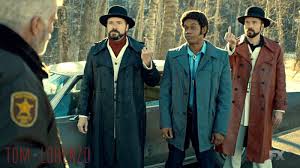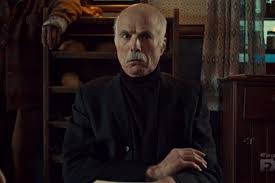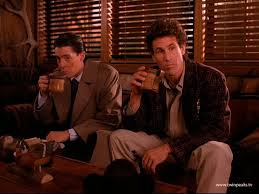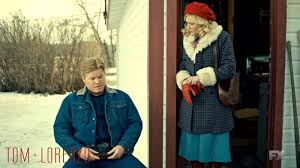I said last week I’d try to sort out what this season of Fargo is all about, and with “Before The Law”, I think certain elements are coming into focus, while others remain opaque and seemingly arbitrary. Which is precisely what makes this show as true to the Coen Bros’ spirit as anyone who didn’t slide out of the fair Mrs. Coen themselves is likely to get, more so than the specific references or setting. But it’s hard to nail these things down too specifically, because the overarching theme is bafflement.
It’s what Lou tells his father-in-law haunts him most about his experience in Vietnam (sidebar: the brief pause between Lou responding that he doesn’t want to talk about it, then launching in anyway, is so, so great). The look of shock and incomprehension on the face of a kid who was shot through the cigar. Hank’s anecdote in response indicates a different kind of trauma from a different kind of war: coming upon the body of an enemy already defeated, and tactful enough to have taken his own life in advance of capture. He also muses that maybe veterans like Lou brought their messier, more confusing war home with them.
He’s not the only one feeling out of sorts, or that America has taken a turn for the unfocused worse. The season kicked off with Jimmy Carter trying to snap the public out of it, while Kansas City enforcer Mike Milligan poses the question directly to a higher power in General Electric as to why “our once great nation is going down the crapper?” And this is before his threat/philosophical aside about the minor miracle it took for he and Hank to both show restraint at a roadside stop, “while all around men are losing their minds.” Even the ladies at the beauty shop, naturally appalled and befuddled at the Waffle House Massacre, waste no time in connecting the local news to the national tenor. “First Watergate and now this? What’s the world coming to?”
It’s coming, if not to ruin, then at least unmoored, as the Waffle House Massacre is reaffirmed to no longer be a “local matter”, but a quagmire that will quickly suck in county, state, and perhaps federal law enforcement, the Gerhardt syndicate, the looming Kansas City conglomerate, a hapless butcher, his wife, plus I’m going to guess her amorous boss and a few other collateral victims. This much is clear: there’s a war coming, and it will be (as they all are in this brave new world) a world war, with none of the participants understanding the full contours or ramifications of it.
Which suits Dodd just fine. He wants a war to fight in, like his grandfather the WWI vet, practically beaming as he says the word. And if it has to be a civil war, as he concludes after apparently downing an entire, enormous rye loaf, then that’s okay too. He tells his little brother “I’m the oldest, I’m the boss. End of story.” But his mother, like Hawley and the Coens, sees things in more complex, interconnected terms. Where Dodd sees only his own rightful ascension to the family throne, she sees a single chapter of a larger familial saga, which still fails to take into account all the parties listed in the last paragraph.
So to recap this recap: everyone’s confused and scared and making bad choices because of it, and there’s some sort of vague Vietnam metaphor embedded in this 70s crime story, because of course there is, how could there not be, the subtext of every piece of media from 1969-2001 was about Vietnam*, after which everything became about 9/11 or how 9/11 was faked by Hasbro and The Elders Of Zion. This stuff is mostly just common sense. Let’s get to something more confounding: what’s up with the seafood references in this episode?
Specifically, people keep rejecting seafood. Whether of the metaphorical variety, as Brad Garrett does with the lobster claw comparison, or young Betsy stopping Hank from eating a freshly caught oyster, or the fictitious “clams, from a can” (the third best band to come out of the 1980’s Cleveland punk scene) which supposedly put Ed out of commission. “Never trust anything that came from the sea,” his butcher boss opines, with a dash of self-serving/promotion, though his employee(/daughter?) notes “we came from the sea.” That line there is the key, I think.
I mean, it has to be. But I don’t have any idea what it’s actually getting at. Beyond 1970s Minnesota residents’ understandable skepticism for shipped seafood, it seems an odd motif in a noir-ish crime story. But then, landfood doesn’t come off much better in the episode. Betsy can’t stomach the smell of eggs cooking, Mike and the nattily-dressed Kitchen Bros can’t get their waffles, and the glimpse we get of Ed making sausage just underlines why there’s a saying about not wanting to see that. Fargo is on the verge of becoming the reverse Twin Peaks, where everything is gross, everyone hates eating, and even the coffee is bad enough to provoke a letter to the editor. The only one to take any satisfaction from their repast is the dog that helps himself to the bucket Dodd and his pal drop their victim’s severed ears into.
But I digress. Let’s talk a bit about poor Jesse Plemons, forever consigned to be disposing of hastily murdered corpses in the South/Midwest, and usually at the behest of a cute blonde. It’s a very specific circle of small screen hell he is doomed to inhabit, but at least the shows he does it on are top notch. Ed is constitutionally unsuited for such work, but has the technical proficiency to carry him through. Which is the inverse of his wife, who thrills at breaking the rules, but lacks the snowing skills (or just self-preservation instinct) to hide either the busted up car/scene of the murder or stolen box of TP from her boss during a visit that lasts maybe 4 minutes.
But that’s what makes them such perfect Midwestern Macbeths. That connection was alluded to rather heavily in the promos of Peggy washing red hair dye off her hands and having a literal “out, damned spot” moment in the mirror. The Scottish play endures (and I can’t wait for the Fassbender/Cotillard version coming down the pike) because of its simple but compelling dramatic arc; she urges him to abandon his conscience in pursuit of power, only to grow one of her own once he’s become the monster she pushed him to be. It’s dually, inversely tragic, and achieves that without the need to overcomplicate the narrative. It’s magnificent, and I’m happy to watch Dunst and Plemons put a quirky spin on it, but it’s also an unusual choice for a show trying to ape the Coens. Those boys are erudite types for sure, but their literary touchstones tend to go back past the Bard, to Talmudic parables or Greek mythology. There’s a particular figure from the latter that recurs constantly throughout their work, but I’ll get to that next week. And maybe have some more about the parallels between the women’s lib seminar Peggy is encouraged to attend, or Betsy’s promised visit to see her at the salon.
Man, I’m excited to see more of this show, and unlike FX’s other offerings, I’ll gladly take 90+ minute episodes as long as they’re giving them out. So, okay then. On to Coen Bingo, and other random Shit.
COEN BINGO AND OTHER RANDOM SHIT
– From last week, I realized that No Country also features a murdered being randomly hit by a car leaving the scene of a crime. It also sounds like the Judge’s name was Mundt, which I didn’t catch before.
– The typewriter salesman’s wheedling on the phone sounds very reminiscent of William H. Macy in the film.
– Danson’s roadside interrogation threatens to mirror the unfortunate stop of Buscemi and Stormare at the beginning of the film, and thankfully goes better than Gus pulling over Malvo at the beginning of last year.
– The sausage machine is not quite as gruesome as the wood chipper, but the way the body parts are presented and…processed is even more gross than the chromatic spray on the snow.
– Bear sharpens and carries an axe around the grounds, like the one that ends Buscemi in the film. The Coen’s may not go in entirely for Chekov’s theories on gun control, but I’ll be a monkey’s uncle if someone doesn’t get the chop with that thing by season’s end.
– Probably a stretch, but Dodd giving a speech to his victim’s (already earless) corpse called to mind the police chief lecturing a catatonic Dude in The Big Lebowski.
– Lou and Danson’s exchange of war stories and his musings about how things used to be are very reminiscent of Ed Tom Bell’s musings about in No Country.
.
.
*there are but 2 exceptions: the hip hop single “Baby Got Back”, which is about large butts and large men’s large enthusiasm for same, and Castlevania: Symphony of the Night, a popular SNES platformer/veiled allegory for the Six Day War.





